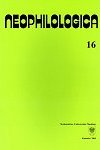La riqueza de una lengua – diferencias semánticas entre las construcciones con tres verbos aspectuales españoles
Richness of Language – Semantic Differences in Periphrastic Constructions with Spanish Aspectual Verbs
Author(s): Joanna Wilk-RacięskaSubject(s): Language and Literature Studies
Published by: Wydawnictwo Uniwersytetu Śląskiego
Keywords: aspect; aspectual value; conceptual constructions; semantic / syntactic functions; auxiliary verbs; aspectual representations; aspectual morphemes; syntactic operators
Summary/Abstract: The subject matter of this article covers considerations on semantic differences in the use of Spanish periphrastic constructions with the verbs VOLVERSE, HACERSE and QUEDARSE. The analysis was conducted in accordance with the rules of semantic-based grammar. The author comes to the conclusion that those verbs–which appear in periphrastic constructions–are not "simple" syntactic operators but the so-called aspectual verbs. These verbs express the dominant aspect in compound aspectual constructions, represented by analyzed paraphrases, and indicate the place of perfectiveness in a given configuration. The verbs in question fulfill also some additional functions. VOLVERSE and QUEDARSE represent concepts fundamentally perfective. VOLVERSE appears exclusively in the constructions with phrases representing a specific type of imperfective predicates, where the use of VOLVERSE makes the whole phrase assume an inchoative aspect. On the other hand, constructions with the verb QUEDARSE, which also appears with perfective predicates, are achievement-type constructions. The basic imperfective aspect of the verb HACERSE is responsible mainly for the procedural character of constructions, which are formed by HACERSE and exponents of features resulting from long-term processes. The main function of HACERSE in periphrastic constructions in past perfective tenses is indicating the moment when the process ends.
Journal: Neophilologica
- Issue Year: 2004
- Issue No: 16
- Page Range: 89-105
- Page Count: 17
- Language: Spanish

